Freshman Enrollment Tips And FAQ
Below you can find key step-by-step guidance to use as a resource both before and after your orientation with Honors College advisors for first-semester enrollment.
Students are encouraged to use this guide to add intended fall semester classes PRIOR to scheduled orientation — this will save you a lot of time at your advising session!
The information below is extensive — but will also answer many frequently asked questions and assist you in planning your first-semester course schedule. Click the topics below for more!
If you have any questions about the information below, feel free to email honors@uh.edu or call 713-743-9010.
-
Freshman Enrollment
The Honors College has specific flowcharts/degree plans designed for every major. Each flowchart includes all of your degree requirements for the next four years, as well as indications of which Honors courses are required.
The Honors College requires students to complete 36 Honors hours prior to graduation. The breakdown of these hours are as follows:
A. Human Situation sequence, 10 credit hours: Antiquity (6 hours, fall semester) Modernity (4 hours, spring semester)
B. Other University Core Curriculum, 9 Honors credit hours:
- 3 hrs Honors American Government (GOVT 2305 or GOVT 2306)
- 3 hrs Honors American History (HIST 1301 or HIST 1302)
- 3 hrs Honors Core Social and Behavioral Science
An Honors requirement in this category is waived if a student completes that core requirement before joining the Honors College.
C. Honors Colloquium, 3 credit hours: 3 hrs from a selection of courses designated as Honors Colloquia, or three credit hours from the six-credit hour Senior Honors Thesis sequence.
D. Additional Honors credit, 14 credit hours: Classes offered with the Honors designation or petitioned for Honors credit, from any discipline, to bring the total Honors credits to 36 hours.
The Honors College also requires all students to take at least one science lab and one math class that is elementary functions or higher (i.e., business calculus, pre-calculus, or statistics)
** See also “Honors Classes in Your Major/Pre-Reqs” below for more information on using these flowcharts.
Honors advisors are available every semester to assist you in making appropriate progress through this flowchart — though for freshman orientation we’re of course focusing on your first semester.
No matter what your major, you’ll notice that the first semester will always contain these classes:
- HUMAN SITUATION — required of all Honors students
- A MATH course — because if you’re a STEM major, you’ll need it as a pre-req for later classes, and if you’re a non-STEM major it’s best to complete your Math core while you still remember your high school math.
- Course(s) in your major necessary for staying on track in your major
- Core Curriculum course(s) — if needed — in order to reach 15-18 hours for the semester
See below for instructions and guidelines for enrolling correctly in all of the above — though first verifying your transfer credits (also below) is an important next step.If you are bringing in any AP/Dual/IB or other forms of transfer credit to UH, it’s important to verify exactly what requirements those credits will count towards before you begin selecting classes for your fall schedule.
The easiest way to do this is via a Transfer Credit Report in your myUH Student Center as follows:
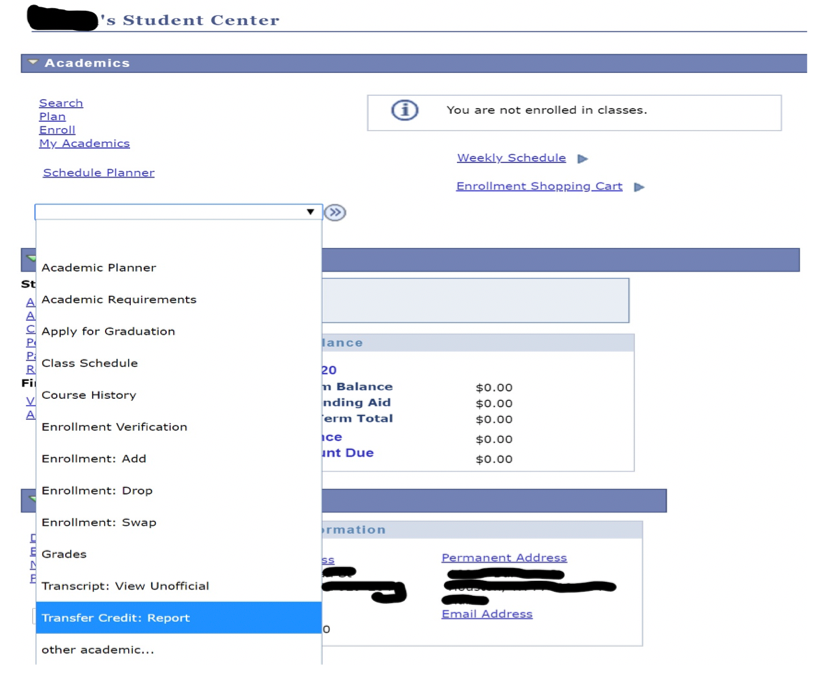

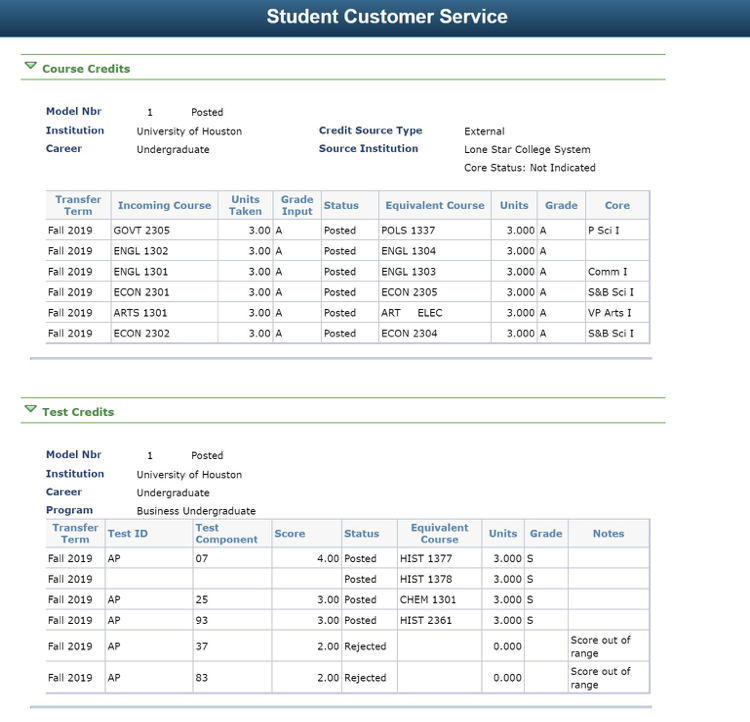
In the “Equivalent Course” column above, you can see exactly what UH classes your posted credits will count towards. These are important to keep in mind as you make decisions whether to use these credits (or not) throughout your degree plan.
Important for STEM majors: It is strongly recommended that you do not use AP credit for BIOL 1306 (Biology for Science Majors) and CHEM 1311 (Fundamentals of Chemistry). Taking these classes at the university level tends to provide a stronger foundation for success as students continue through their degree plans.
Similarly, for pre-med students: While some medical schools allow AP/transfer for certain pre-requisites, using these credits for science pre-reqs will likely make your med school application less competitive. In addition, some medical schools don’t accept science AP credits at all. Therefore, we strongly encourage pre-med students to not use AP/transfer credits for science pre-reqs. Again, these prior credits are not “wasted” credits — instead, they should give you a strong foundation to now do well and demonstrate you are a competitive candidate with your university-level classes. We also highly recommend Honors BIOL 1306 for pre-med students.
WHAT IF MY PRIOR/TRANSFER CREDITS HAVE NOT BEEN POSTED YET?
Some credits will not officially be posted until later in the summer. In this case, you will want to consult the CREDIT BY EXAM BROCHURE which outlines what scores can count for which course credits.
Here is an example:
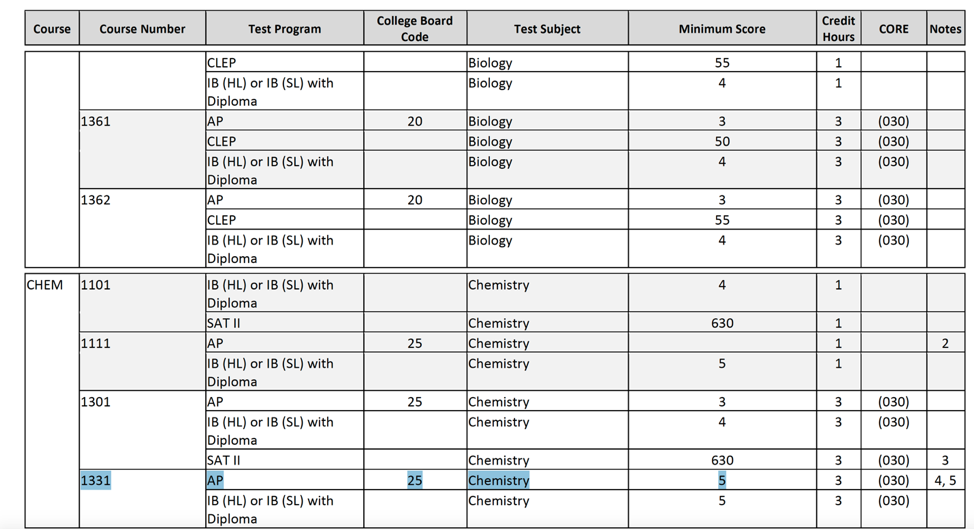
Above, you’ll see that a score of 5 on the AP Chemistry exam gives you credit for CHEM 1311.
Or, here is another example:
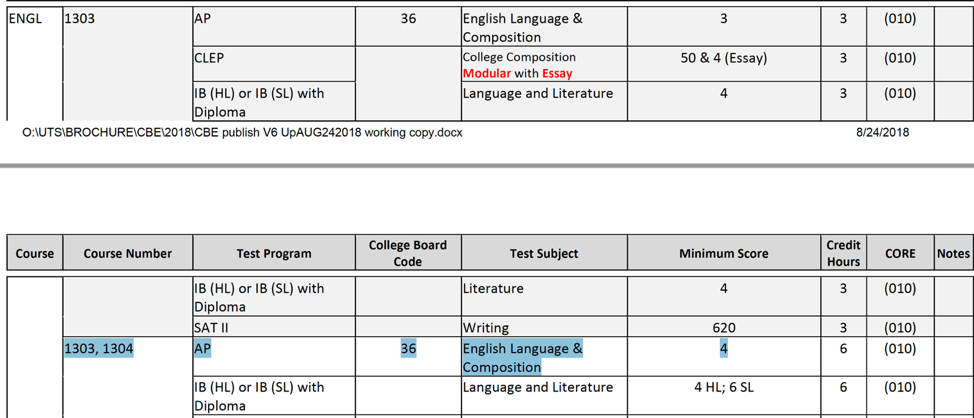
Above, you can see that that a 4 on the AP Language and Composition exam will get you credit for both ENGL 1301 and ENGL 1302 — and if you look a little further above that, you’ll see a 3 on the same exam will get you credit for ENGL 1301 only.
(NOTE: This will be important to remember with Human Situation registration later.)What if the course credit(s) I’m waiting for will alter my first-semester schedule? Or, what if I’m still waiting to hear back on certain scores?
If the course credit is for a pre-req for another course, you will have to wait until that credit comes in before you can enroll in the next course.
If this course is also a pre-requisite for required courses in your major (for example, PSYC 2301 for PSYC majors, or many majors require MATH 2312/Pre-Calculus to enroll in CHEM 1311), we recommend you still enroll in this pre-requisite course at UH for now, if only to secure yourself a spot in it. You can always drop this pre-requisite course later in the summer and replace it with the subsequent course once that prior credit does indeed come in.
If the credit is for a non-major-specific class (such as a core requirement that is not a pre-req), this is less time-sensitive, and you can simply enroll in a different core class/category until the final determination is made for the core class/category in question. See the “Core Curriculum Classes” section below for a full list of core categories and classes.
** See also the “Classes in Your Major/Pre-Reqs" section below for more on how you can use your flowcharts to determine which courses are pre-requisites in your degree plan.
** Remember also our previous recommendation above that pre-med students not use AP/transfer credits for medical school pre-requisites.
Feel free to also follow up with an advisor for further clarification on your transfer credits.
The Human Situation is a two-semester course sequence required of all University Honors students. You can find out more about the content of Human Situation here. You can also find out more about registration and credits you’ll receive for Human Situation here.
Here is the quick version for your fall semester: Human Situation (Antiquity) is comprised of both a 3-hour Discussion section (which, depending on your prior credit, will count as either ENGL 1302 or an Elective credit) as well as a 3-hour Lecture section that fulfills everyone’s language, philosophy and culture core requirement.
For the purposes of this first semester of Human Situation enrollment, there are two primary questions to answer before anything else:
- Do you still need ENGL 1302 (Comp II) credit?
- Or, do you already have ENGL 1302 (Comp II) credit?
- If you still need ENGL 1302 credit, use FORM A to register for Human Situation.
- If you already have ENGL 1302 credit, use FORM B to register for Human Situation.
Click here for a downloadable PDF of both Human Situation Registration Forms
(with Form A on page 1 and Form B on page 2)In both forms, you will notice that there are two Teams for Human Situation: Team Alpha (whose lectures are MWF 11-12) and Team Omega (whose lectures are MWF 12-1).
So, whichever form you are using based on the instructions above, first select a lecture time that works for you (either Team Alpha’s MWF 11-12 or Team Omega’s MWF 12-1), and then simply find a discussion section that corresponds with the same Team (ENGL 1370 or ENGL 2360).
IF YOU’RE USING FORM A, your discussion registration will be ENGL 1370 to receive Comp II credit:
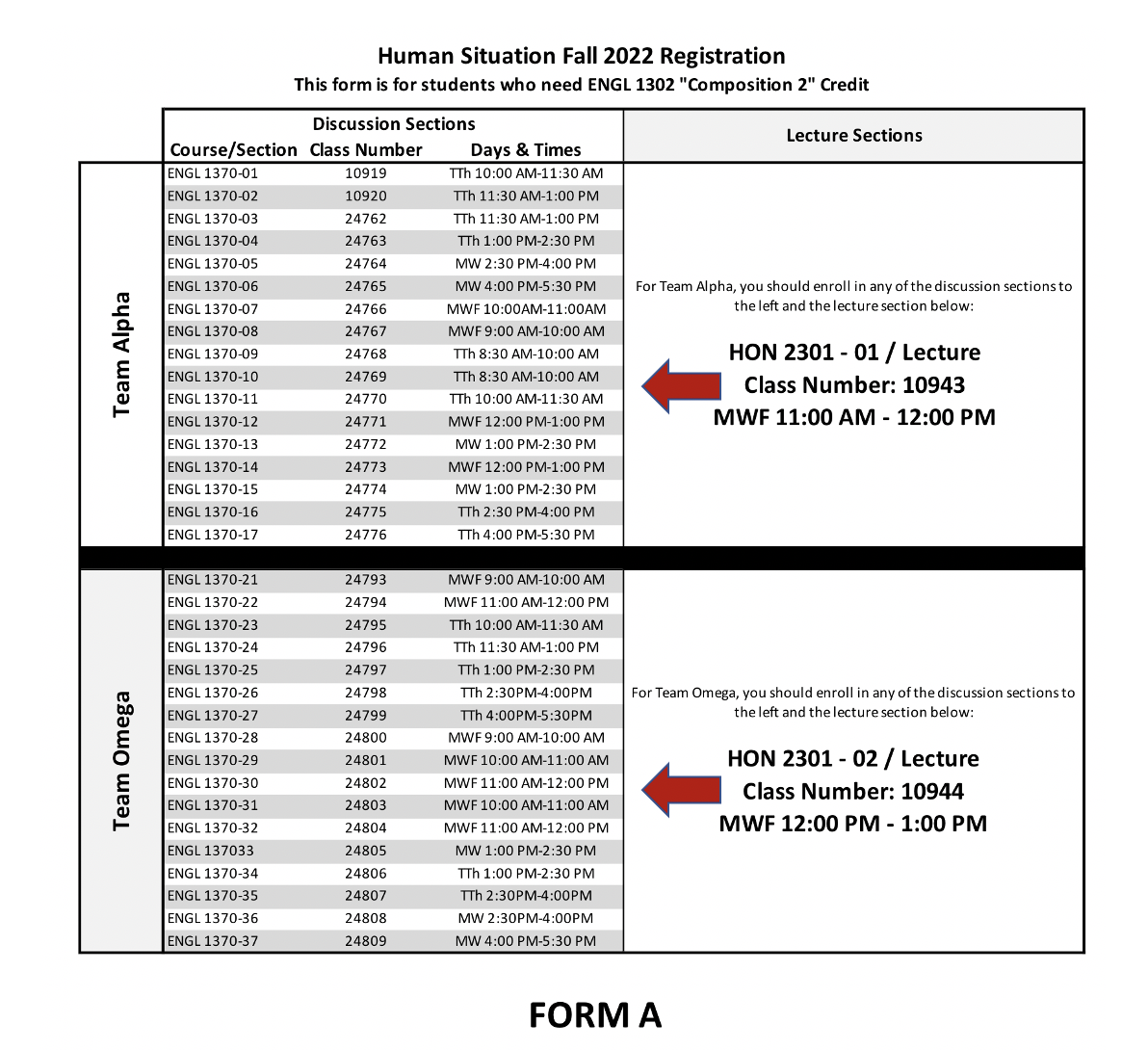
** Note: The above shows examples of proper Form A registration for both Team Alpha and Team Omega — you would of course only need to register for one team as a student.
IF YOU’RE USING FORM B, your discussion registration will be ENGL 2360 to receive an Elective credit instead of your already-existing Comp II credit:
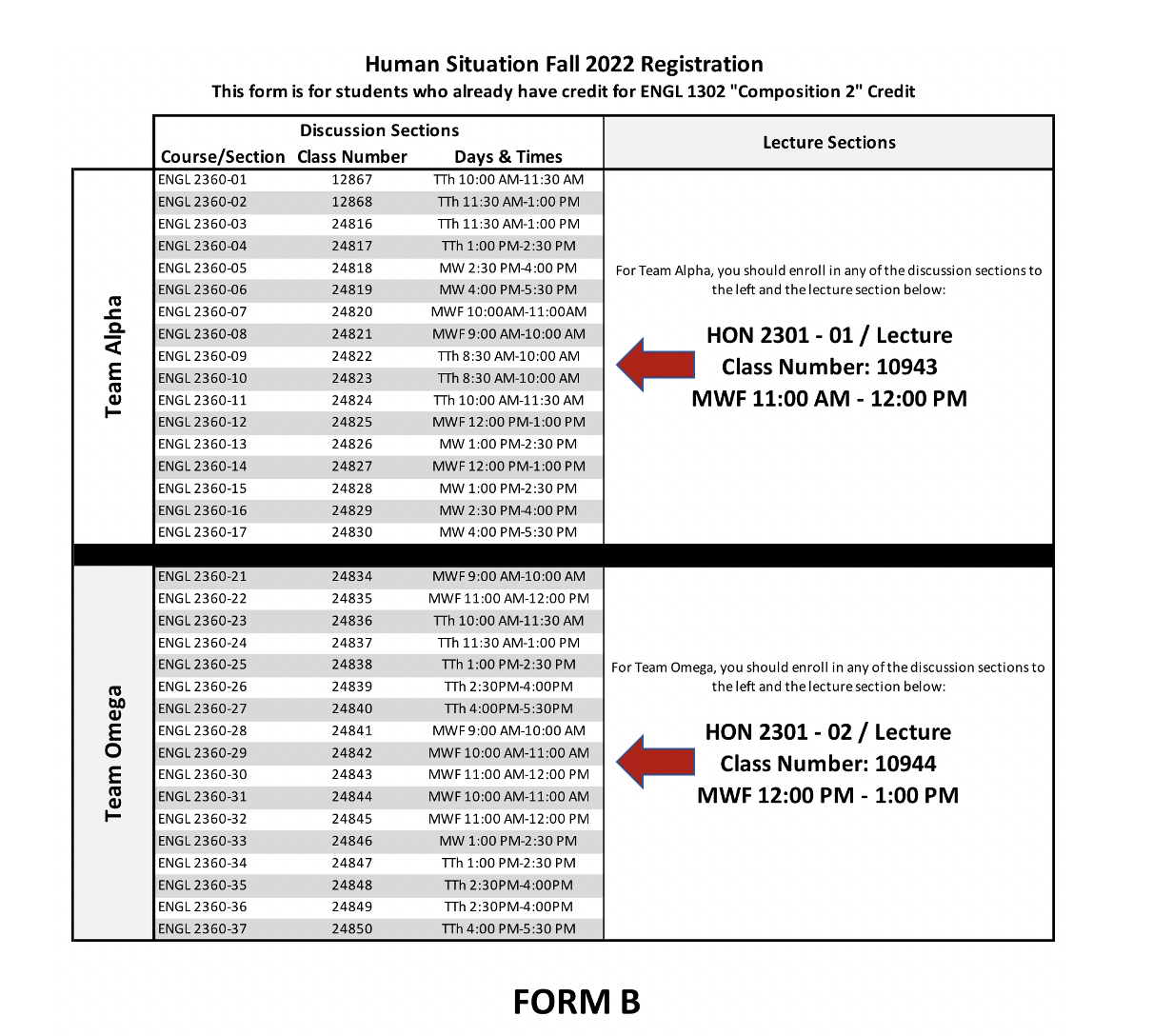
** Note: The above shows examples of proper Form B registration for both Team Alpha and Team Omega — you would of course only need to register for one team as a student.
What if I’m not sure which AP score I have/will get for English Language and Composition?
AP English Language and Composition is typically taken junior year, so you can likely still verify your score. (Remember: If you received a 3, that means you have ENGL 1301 credit but still need ENGL 1302 — so you should use Form A. If you have a 4, you already have ENGL 1302 credit and should use Form B.)
If you are still unsure, the safest bet is to use Form A and enroll in ENGL 1370 as your lecture in order to ensure you receive ENGL 1302 credit. If you mistakenly take ENGL 2360 from Form B as your lecture for an Elective credit and then don’t end up having transfer credit for ENGL 1302 come in, you will still be required to take ENGL 1302 in a later semester in order to fulfill this core requirement and graduate.
Feel free to follow up with an Honors advisor in the coming weeks if your AP credit situation changes after orientation — adjusting your Human Situation registration to ensure you get the appropriate credit is a quick fix.
The University of Houston has two math placement tests. The MATH 2413 (Calculus I) exam is required for students in the College of Natural Science and Mathematics, Engineering, Technology, and is recommended for pre-med students. The MATH 2312 (Pre-Calculus) exam is required for all other students.
Students will receive two online attempts to pass the MATH 2312 exam with a 65 or higher.
For the MATH 2413 exam, students will receive one online attempt to pass the test with an 80 or higher. If a student does not pass on the first attempt, a proctored second attempted will be offered on the first day of orientation.
Online attempts for the math placement exam should be taken at least 24 hours prior to the start of a student's orientation.
For further information on the math placement - Click here
Additional Notes for Honors Students:
Students wishing to enroll in MATH 2450/Accelerated Calculus (where MATH 2450 in the fall and MATH 2451 in the spring covers material from Calculus I, II and III in two semesters) must score an 85 on the MATH 2413 placement exam.
Students needing to take Math 1325 (Business Calculus) must take the MATH 2312/Pre-Calculus placement exam.
A math placement exam is NOT required for the following classes: MATH 1314 (College Algebra), MATH 1332 (Contemporary Mathematics), MATH 1351 (Intro to Geometric Reasoning), MATH 1324 (Finite Math) or MATH 1342 (Statistics).
** Keep in mind that the Math placement exam places you into a class but does not “count” for that class — in other words, a successful score for the MATH 2312 (Pre-Calculus) exam allows you to enroll in MATH 2312. If you need to be in MATH 2413 (Calculus I), you need to get the minimum score for the MATH 2413 placement exam.
If you are unsure which MATH course you should take, you can also consult your Honors Flowchart/Degree Plan to see which MATH course is listed for your first semester — and feel free to consult with an Honors advisor as well. (For example, a PSYC major pre-med would most likely do different MATH classes than a student not majoring in PSYC pre-med.)
Everyone should also take a class from their declared major — and students from the College of Liberal Arts and Social Sciences (CLASS) should note they are required to do so every semester.
To see what classes to take from your major in your first semester, simply consult your Honors Flowchart. (Note: Human Situation will count as a course in major for English majors.)
Keep in mind that many of these courses can have pre-requisites and co-requisites, and these first semester courses can also be pre-reqs for a number of classes coming up in future semesters — so it is crucial to keep up.
Pre-requisites are visually represented on each flowchart by arrows pointing downward to other classes, while co-requisites point sideways.
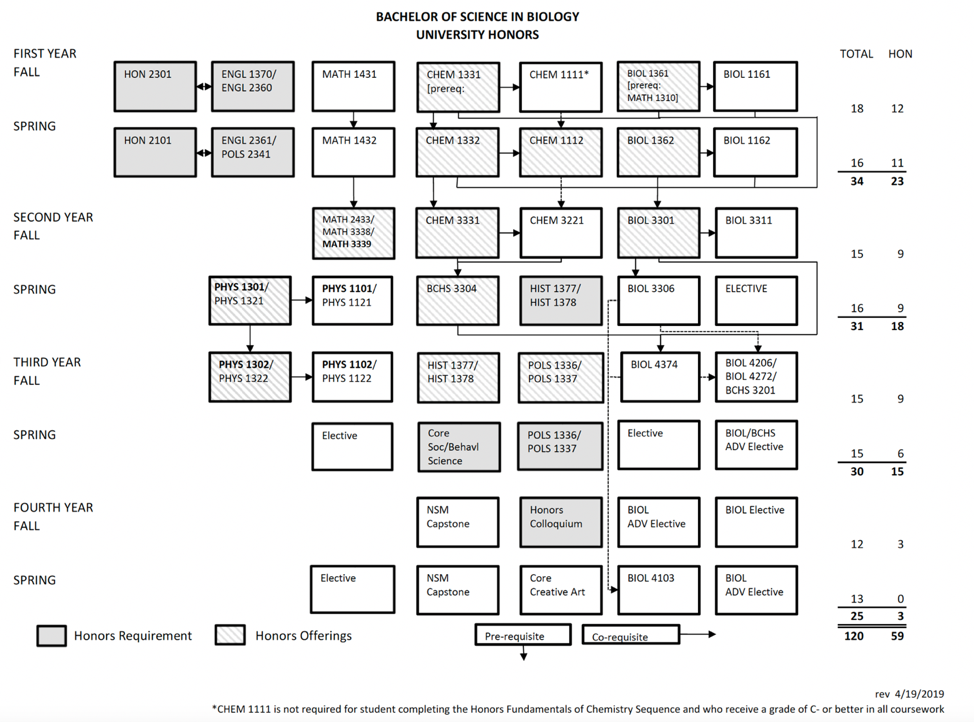
For example, in the above Biology B.S. flowchart, the CHEM 1311 lecture is a co-req for the CHEM 1111 lab, and the BIOL 1306 lecture is a co-req for the BIOL 1106 lab. (In other words, to take a lab, you must take a lecture. It is possible to take a lecture without a lab — but overall, it is highly recommended to take lectures and labs together as both are often pre-reqs for subsequent classes.)
You can also see by the downward-pointing arrows that many courses can be pre-reqs for subsequent classes. Think of these pre-req courses as “holding down” the subsequent courses with their arrows — you cannot advance further to the next linked course until the pre-req in question is taken.
On the other hand, if you already have prior credit for a pre-req course, you might think of this chart as a “reverse Tetris” game, where the blocks can possibly “float” upwards. If, say, in the Architecture flowchart below, you already have prior MATH 1314 (College Algebra) credit and wish to move ahead, you can cross out (or “explode”) that MATH 1314 block and have the next required MATH class “float up” into its place in the top row/first semester instead:
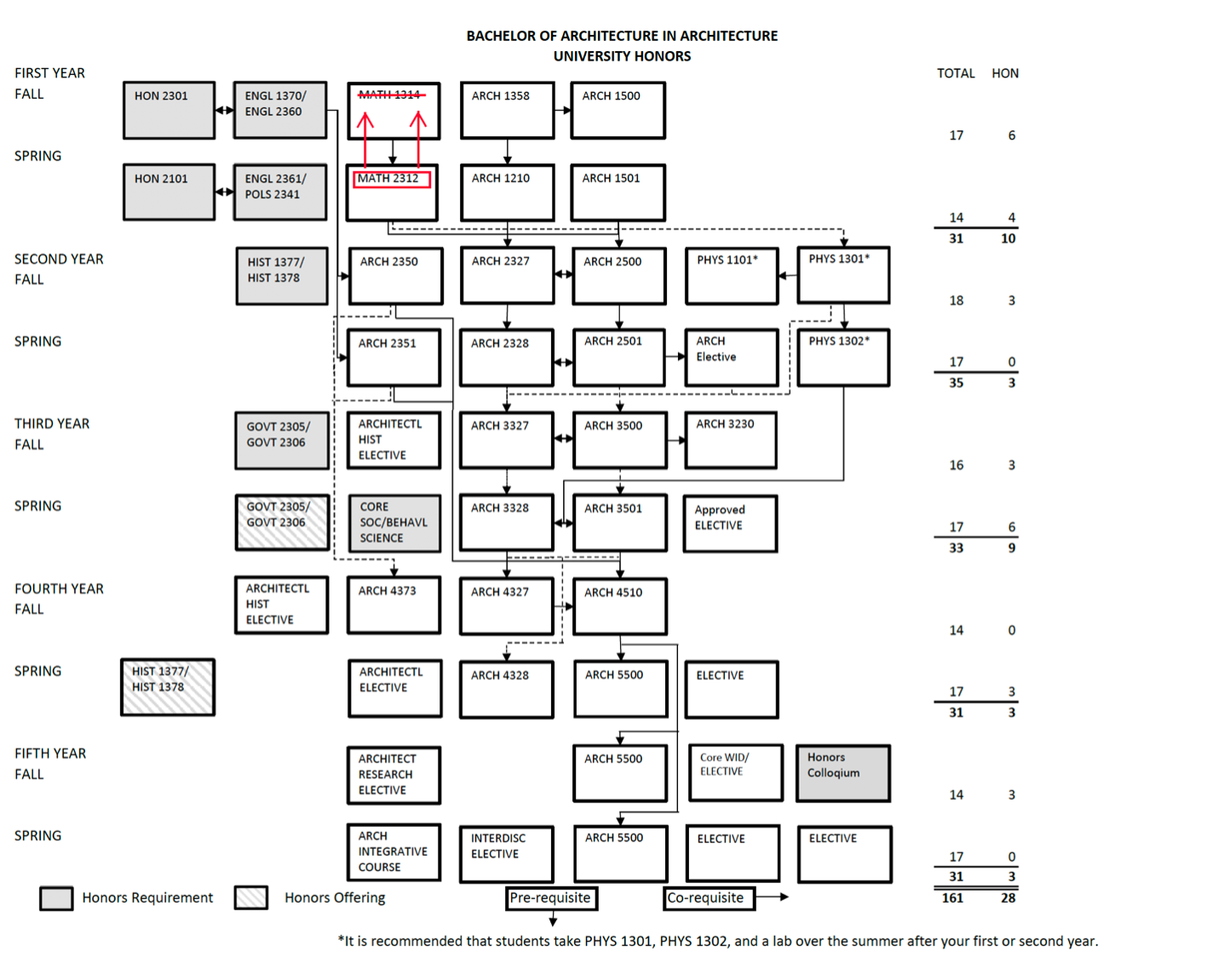
** REMINDER TO PRE-MED STUDENTS: BE SURE TO KEEP IN MIND THE RECOMMENDATIONS IN THE “VERIFYING TRANSFER REQUIREMENTS” SECTION ABOVE REGARDING NOT USING AP/DUAL/TRANSFER CREDITS FOR MEDICAL SCHOOL SCIENCE PRE-REQUISITES, ETC.
All pre-requisite courses are also fully listed on the second page of your Honors Flowcharts as well for further reference and explanation.
As a rule, you are allowed to “move ahead” in your degree plan if you have fulfilled any pre-reqs — but you are welcome also to still take the pre-req course again at the university level if you wish. Again, feel free to consult with an advisor if you have questions about this.
Honors classes offered in your major are of course recommended, and this is a primary way for students to reach the expected 36+ Honors hours for University Honors: Biology majors take Honors Biology courses; engineering students take Honors Engineering courses; Bauer students take Honors Business classes, etc. We also highly recommend Honors BIOL 1306 for pre-meds.
You can always find the specific Honors sections of such courses in the online Honors Coursebook
A quick note on Honors Chemistry (CHEM 1321): This class is required for Honors Biomedical Sciences majors and is typically recommended for chemistry majors and chemical engineering majors. It is also open to any students who feel far enough along with their previous chemistry studies. It is required that you already have completed two semesters of high school chemistry, and it is also worth noting that this Honors section starts on Chapter 4 of the chemistry textbook, with an understanding of moles already expected. Here is the full description of the conditions and requirements for Honors CHEM 1321:
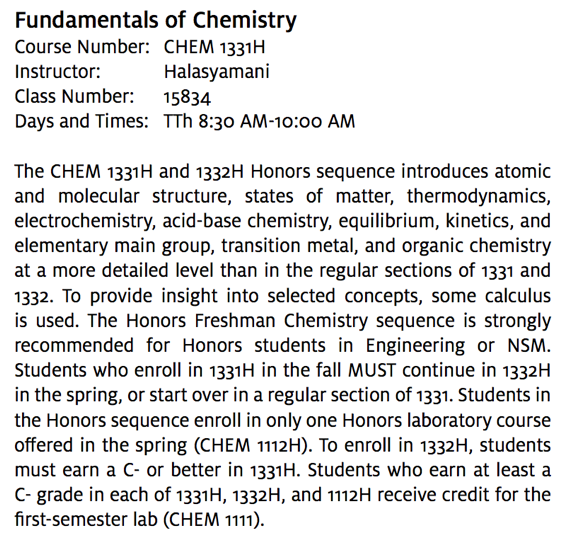
What if I’m not seeing many Honors sections offered for classes in my major?
There are many pathways to University Honors, and taking Honors classes in your major is only one of many ways to get Honors credits. Feel free to consult with an Honors advisor every semester to find the best path that works for you — which can include major classes, minor courses, core courses, a Colloquium class, a senior honors thesis and more.
In the meantime, do also be aware that any courses in your degree plan not offered as Honors sections can be petitioned for Honors credit — and this is how many students reach the necessary number of Honors hours. For more information on this process, simply go to the Honors Credit Petition Form — and of course see an Honors advisor for further guidance.
After all of the above, if you are still needing a class to reach the recommended 15-18 hours of enrollment in your first semester, your Honors Flowchart will list some possibilities from the UH Core Curriculum as well. For a full list of courses that will count towards each Core Category Requirement, see this document: Core Fall 2025
Many of the Texas Core Category classes listed in your flowchart will be “free-standing,” with no pre-requisites attached, so these can be switched and moved around as needed.
For example, with the Industrial Engineering B.S. flowchart below, it suggests taking either HIST 1301 or HIST 1302 to reach 15+ hours in your second semester. If, however, the available sections for both HIST 1301 and HIST 1302 don’t fit your schedule, you could take a core GOVT 2305 or GOVT 2306 instead, and then simply move the HIST 1301/HIST 1302 block down to the spring semester of your sophomore year.
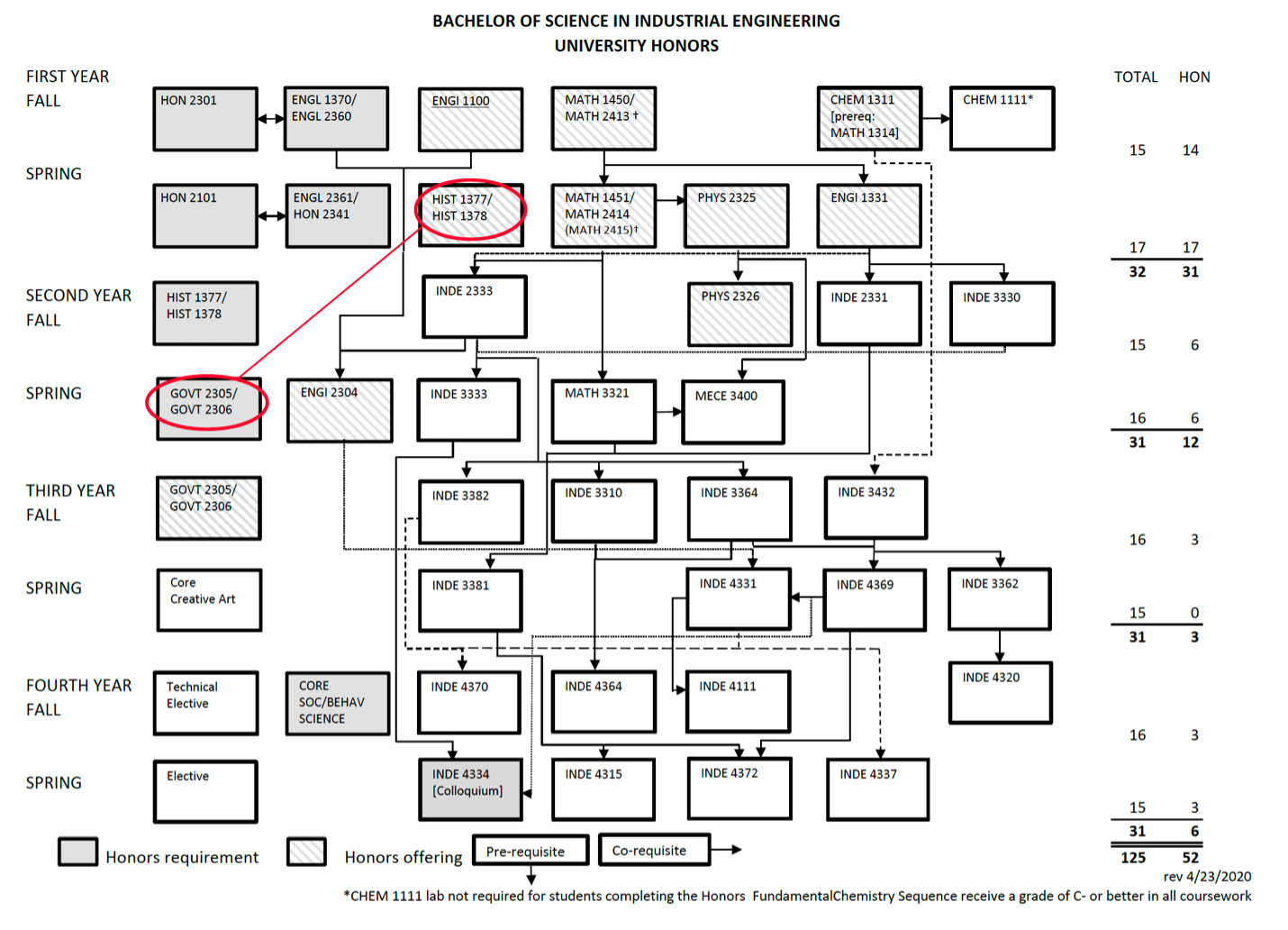
Three Core Curriculum categories (Government, U.S. History and Social/Behavioral Sciences) are required to be fulfilled with Honors sections of certain courses unless these core categories have already been completed with prior/transfer credits.
Here is a step-by-step process of determining whether each requirement is already fulfilled and can be waived for you — or if you should still take certain core classes as Honors sections:
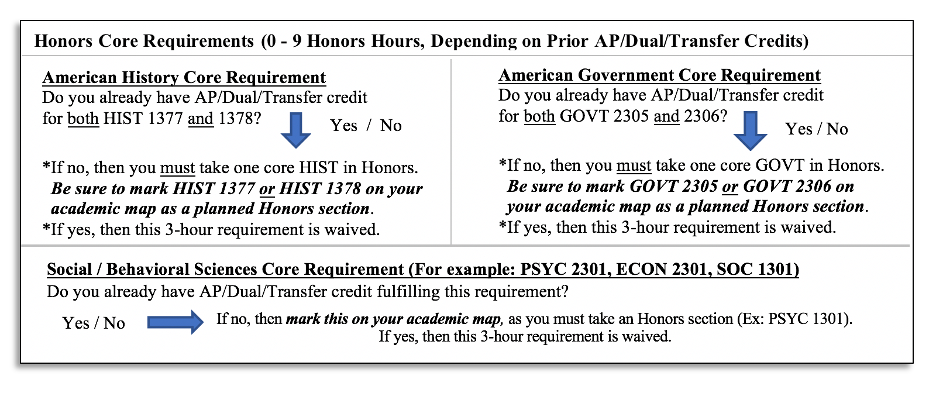
As always, feel free to consult with an Honors advisor to verify that necessary Honors Core Requirements are being met.
While you will not be able to register for courses until your orientation, you can complete much of this process in your UH account (and save a lot of time) before the meeting.
This PDF will walk you through those steps: searching for the courses outlined above, selecting the times/days that work best for you, and more.
Once you’ve completed these steps and have classes loaded into your shopping cart, an Honors advisor will verify everything is correct at your orientation advising session or will make further suggestions. If everything is correct, you will be able to enroll immediately!
HONORS MENTORS
For guidance through your first semester at UH, all incoming Honors College freshmen are paired with an Honors Mentor — offering advice, tips and help in how to make the most of your time at UH. They will be hosting events in the coming months so that you can get to know other Honors College students, staff and faculty — but don’t be afraid to reach out to your Mentor before then if you have further questions or concerns!
With the above in mind:

Honors Retreat marks the beginning of each new school year and is another excellent way for new incoming Honors College students to meet upperclassmen, faculty, staff and alumni. It is currently scheduled for Thursday, August 21 – Friday, August 22, and students can sign up now!
CONTINUED ACADEMIC ADVISING
As you begin your first semester at UH, Honors College academic advisors will also be available throughout every semester to assist you with a variety of questions, issues, and opportunities — with drop-in/walk-in advising occurring most Fridays. Appointments may also be made year-round via the Navigate app.
HONORS MINORS AND PROGRAMS
We also encourage you to look into the various Honors Minors, Curricular Programs, and Co-Curricular Programs available at the Honors College as you continue your undergraduate careers — and feel free to contact your respective program directors for more information!
In the meantime, we look forward to seeing you all at Honors Orientation and in the 2025-2026 school year! Go Coogs!
The First actual "Section" - Read Me?
Landing pages give you many interesting design options. The Edit: Content panel is where you make your vision a reality; however, that may mean sorting through a lot of editing tools which may have lots of options and sub-options. This Section offers some practical and pragmatic tips on the Edit panel as a whole. Open each of these Accordion Collapsible areas to learn more.Landing pages give you many interesting design options. The Edit: Content panel is where you make your vision a reality; however, that may mean sorting through a lot of editing tools which may have lots of options and sub-options. This Section offers some practical and pragmatic tips on the Edit panel as a whole. Open each of these Accordion Collapsible areas to learn more.Landing pages give you many interesting design options. The Edit: Content panel is where you make your vision a reality; however, that may mean sorting through a lot of editing tools which may have lots of options and sub-options. This Section offers some practical and pragmatic tips on the Edit panel as a whole. Open each of these Accordion Collapsible areas to learn more.Landing pages give you many interesting design options. The Edit: Content panel is where you make your vision a reality; however, that may mean sorting through a lot of editing tools which may have lots of options and sub-options. This Section offers some practical and pragmatic tips on the Edit panel as a whole. Open each of these Accordion Collapsible areas to learn more.The First actual "Section" - Read Me?
Landing pages give you many interesting design options. The Edit: Content panel is where you make your vision a reality; however, that may mean sorting through a lot of editing tools which may have lots of options and sub-options. This Section offers some practical and pragmatic tips on the Edit panel as a whole. Open each of these Accordion Collapsible areas to learn more.Landing pages give you many interesting design options. The Edit: Content panel is where you make your vision a reality; however, that may mean sorting through a lot of editing tools which may have lots of options and sub-options. This Section offers some practical and pragmatic tips on the Edit panel as a whole. Open each of these Accordion Collapsible areas to learn more.Landing pages give you many interesting design options. The Edit: Content panel is where you make your vision a reality; however, that may mean sorting through a lot of editing tools which may have lots of options and sub-options. This Section offers some practical and pragmatic tips on the Edit panel as a whole. Open each of these Accordion Collapsible areas to learn more.Landing pages give you many interesting design options. The Edit: Content panel is where you make your vision a reality; however, that may mean sorting through a lot of editing tools which may have lots of options and sub-options. This Section offers some practical and pragmatic tips on the Edit panel as a whole. Open each of these Accordion Collapsible areas to learn more.
HONORS MENTORS
For guidance through your first semester at UH, all incoming Honors College freshmen are paired with an Honors Mentor — offering advice, tips and help in how to make the most of your time at UH. They will be hosting events in the coming months so that you can get to know other Honors College students, staff and faculty — but don’t be afraid to reach out to your Mentor before then if you have further questions or concerns!
With the above in mind:
Honors Retreat marks the beginning of each new school year and is another excellent way for new incoming Honors College students to meet upperclassmen, faculty, staff and alumni. It is currently scheduled for Thursday, August 21 – Friday, August 22, and students can sign up now!
CONTINUED ACADEMIC ADVISING
As you begin your first semester at UH, Honors College academic advisors will also be available throughout every semester to assist you with a variety of questions, issues, and opportunities — with drop-in/walk-in advising occurring most Fridays. Appointments may also be made year-round via the Navigate app.
HONORS MINORS AND PROGRAMS
We also encourage you to look into the various Honors Minors, Curricular Programs, and Co-Curricular Programs available at the Honors College as you continue your undergraduate careers — and feel free to contact your respective program directors for more information!
In the meantime, we look forward to seeing you all at Honors Orientation and in the 2025-2026 school year! Go Coogs!